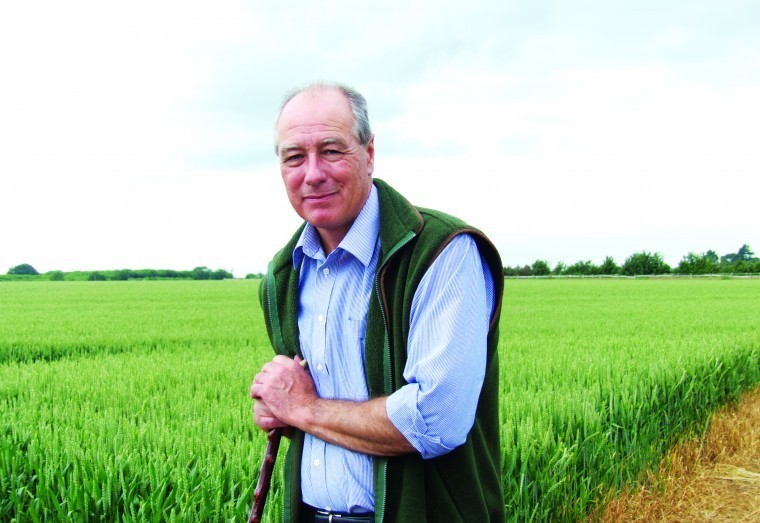In fairness the old year has seen benign weather in terms of rainfall and temperatures through the autumn and into winter. So where crops have emerged they have continued to grow and look respectable from wheats through oilseed and beans.
Slugs have appeared in first and second wheats and we have managed a modest focussed campaign of metaldehyde pelleting which has produced good slug kill results. Spraying is up to date with particular attention to follow up aphicides for barley yellow dwarf virus.
On some areas of wheat with emerged blackgrass the good growing and spraying conditions have persuaded us to try our luck with Hatra and a further residual top up to at least prevent a disappointing situation getting worse. Bearing in mind that the black grass is resistant to contacts I may well just be disappointed again.
As many of you will be aware Hutchinson’s have been working on the i-tillage programme with Cousins to develop two cultivators to help with tackling black grass culturally as well as chemically. We have never been impressed with the slot seeding behind the narrow sub soil leg as the rows are too far apart for the areas where we have to tackle pigeons for three to four months of the year. The pigeons just seem to land in the stubble strips gleaning those and then adding greens from the oilseed rape rows. It looks like behavioural training of pigeons to eat oilseed rape. That said local farmers do use the system successfully but generally on the better soils away from woods and pigeons.
However we have been persuaded to try the Cousins Surface Cultivator. This is designed to give a controlled shallow pass keeping black grass in the top 50 millimetres of soil and hopefully encouraging germination prior to spraying off for a stale seed bed with glyphosate. Early in harvest when we had moisture the results were encouraging. Moisture was conserved and a fine shallow seedbed produced as long as there was not too much straw to cope with. The result was a good germination of all weeds and volunteers which led to good stale seedbeds which then flowed through to good establishment.
Of particular note where we had baled straw on the heavy clays we have successfully established oilseed rape behind this cultivator using a Vaderstaad drill. Where we did not bale the straw we were less successful and I think that trying to incorporate the straw from a nine tonne a hectare wheat crop into 50mm of soil was not possible this year with so little moisture. The straw simply stopped the moisture reaching the seed to successfully germinate and get it away.
In this scenario we have thin borderline establishment of oilseed rape that may successfully survive the winter and may not. One additional benefit we did notice was that where we used Crawler/carbetamix on bad black grass fields with the fine seedbeds we have got very good residual control which has left a lot less black grass for contacts and Kerb to deal with.
With first wheat following oilseed and a lot less straw to incorporate the cultivator worked well. Again with second wheat the quantity of straw was difficult to incorporate. This year the absence of rain for a couple of months did not help as cultivations proceeded and weeds did not germinate. Stale seedbeds were really just a tilth full of dormant weed seed into which we drilled wheat. Still, an interesting year to trial a new cultivation system and a year on we will have more experience of using it in different conditions and soil types.
Politically we have had the year of the European Union referendum and the decision to leave and now we are into the year of starting the process. I have never been convinced that triggering article 50 in March just as the elections in France and Germany get underway was a good strategic move: much later in the year post the German result would seem to be more sensible.
Perhaps the legal battles may move that date back producing an unintended strategic gain. Watching the European posturing and manoeuvring to an opening position I am increasingly convinced that to come to a successful negotiated settlement the UK government absolutely must start from the default position of leaving on World Trade Organisation (WTO) conditions and setting out a political case and economic reforms to make a success of that scenario.
The evolving European position and attitude have finally convinced me that we need to leave. Watching the prime minister being cold shouldered in Brussels by a group of fellow leaders – most of whom govern countries that benefit from our contributions – was deliberately intimidating and she should have simply walked out.
Our whole industry should be directing its thoughts to what we want out of Brexit and trading with WTO conditions. Clearly in arable farming we absolutely need a return to a risk based assessment of plant protection products so we can keep existing products and have similar access to products as producers in the rest of the world.
If exit negotiations saddle us with the current hazard based approval regulations nothing will be gained. I would take that change in preference to single market access because I believe it is pivotal to the competitive future of arable farming – and one way or another we will need to grasp every competitive advantage that we can.




